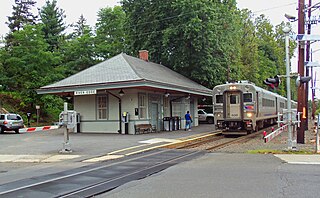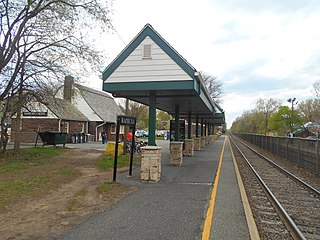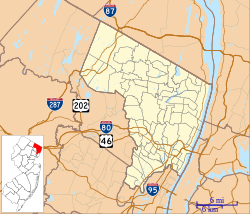
The New York, Susquehanna and Western Railway, also sometimes referred to as New York, Susquehanna and Western Railroad, Susie-Q or the Susquehanna, is a Class II American freight railway operating over 400 miles (645 km) of track in three Northeastern states, New Jersey, New York, and Pennsylvania.

The Pascack Valley Line is a commuter rail line operated by the Hoboken Division of New Jersey Transit, in the U.S. states of New Jersey and New York. The line runs north from Hoboken Terminal, through Hudson and Bergen counties in New Jersey, and into Rockland County, New York, terminating at Spring Valley. Service within New York is operated under contract with Metro-North Railroad. The line is named for the Pascack Valley region that it passes through in northern Bergen County. The line parallels the Pascack Brook for some distance. The line is colored purple on system maps, and its symbol is a pine tree.

Wood-Ridge is an active commuter railroad train station in the borough of Wood-Ridge, Bergen County, New Jersey. Located next to the interchange of Route 17 and Moonachie, the single low-level side platform station services trains of New Jersey Transit's Pascack Valley Line between Hoboken Terminal and Spring Valley. The next station to the north is Teterboro and to the south is Secaucus Junction. Wood-Ridge station is not accessible to handicapped persons and contains parking along Park Place East.

Oradell is a grade-level commuter rail station for New Jersey Transit in the borough of Oradell, Bergen County, New Jersey. Located at the intersection of Oradell Avenue and Maple Avenue, the station serves trains on the Pascack Valley Line.

Emerson is an active commuter railroad station in the borough of Emerson, Bergen County, New Jersey. The station, serviced by trains of the Pascack Valley Line from Spring Valley in Rockland County, New York to Hoboken Terminal in Hudson County, New Jersey, is located at the intersection of Kinderkamack Road and Linwood Avenue in Emerson. The next station to the north is Westwood while the next to the south is Oradell. The station has a single track and single low-level side platform along Kinderkamack Road, without handicap accessibility under the Americans with Disabilities Act of 1990.

Westwood is an NJ Transit railroad station in Westwood, New Jersey. It is on the Pascack Valley Line and is located at Broadway and Westwood Avenue. The next station northbound, heading toward Spring Valley, New York, is Hillsdale. The next station southbound, headed for Hoboken Terminal, is Emerson. The station consists of one track, one low-level platform with a miniature high-level platform and a station depot maintained by the borough of Westwood. Westwood also maintains the parking lots, consisting of 226 parking spaces, six of which are accessible based on the Americans With Disabilities Act of 1990.

Hillsdale is an active commuter railroad station in the borough of Hillsdale, Bergen County, New Jersey. Servicing trains on New Jersey Transit's Pascack Valley Line, the station is located at the intersection of Broadway and Hillsdale Avenue. The next station to the north toward Spring Valley station is Woodcliff Lake and the next station to the south toward Hoboken Terminal is Westwood. The station contains one track while a single low-level side platform next to the station depot, resulting in no accessibility for handicapped persons under the Americans with Disabilities Act of 1990.

Woodcliff Lake is an active commuter railroad station in the borough of Woodcliff Lake, Bergen County, New Jersey. Located at the junction of Woodcliff Avenue and Broadway on the edge of the Woodcliff Lake Reservoir, the station is served by trains of New Jersey Transit's Pascack Valley Line. The station, which contains a single track and low-level side platform, is not accessible per handicapped persons under the Americans with Disabilities Act of 1990. As of November 8, 2020, Woodcliff Lake is serviced seven days a week by New Jersey Transit trains, having previously only been a single train on weekends and holidays up to that point.

Park Ridge is an active commuter railroad station in the borough of Park Ridge, Bergen County, New Jersey. Located at the intersection of Park and Hawthorne Avenues, the station services trains on the Pascack Valley Line, which runs from Hoboken Terminal to Spring Valley station in New York. The station contains a single low-level side platform split by Park Avenue and a wooden station depot, built by the Hackensack and New York Extension Railroad. As a result, Park Ridge station is not handicap accessible under the Americans with Disabilities Act of 1990.

Montvale is an active commuter railroad station in the borough of Montvale, Bergen County, New Jersey. Located in the middle of an active road junction of East Grand Avenue and Kinderkamack Road, the station serves trains on New Jersey Transit's Pascack Valley Line, serving as the first/last stop in New Jersey. The station consists of one low-level side platform with a mini-high-level platform to service handicapped customers under the Americans with Disabilities Act of 1990.

Dover is an active commuter railroad train station in the borough of Dover, Morris County, New Jersey. Located at the end of electric service, Dover station serves as a secondary terminal of NJ Transit's Morristown and Montclair-Boonton Lines. Non-electric service continues west to Hackettstown on both lines. The next station to the west is Mount Arlington while the next station to the east is Denville. Dover station consists of a single island platform, accessible for the handicapped.

Hawthorne is an active commuter railroad station operated by New Jersey Transit in the borough of Hawthorne, Passaic County, New Jersey, United States. It is the northernmost station in Passaic County along New Jersey Transit's Main Line. Trains coming through Hawthorne service Waldwick, Suffern and Port Jervis to the north and Hoboken Terminal to the south, where connections are available to New York City via Port Authority Trans-Hudson and ferries. The station, accessible only by Washington Place in Hawthorne, contains only two low-level platforms connected by a grade crossing. As a result, the station is not compliant with the Americans with Disabilities Act of 1990.

Ridgewood is a railroad station operated by New Jersey Transit in the village of Ridgewood, Bergen County, New Jersey, United States. A major transfer station, Ridgewood has two high-level platforms for the Main Line and Bergen County Line.

Waldwick is a commuter rail station operated by New Jersey Transit in the borough of Waldwick, Bergen County, New Jersey, United States.

Ramsey is one of two railroad stations operated by New Jersey Transit in the borough of Ramsey, Bergen County, New Jersey, United States. Located on the Main Line and Bergen County Line, Ramsey station is also unofficially known as Ramsey – Main Street due to the opening of Ramsey Route 17 station to the north in 2004.

Rutherford is a New Jersey Transit railroad station served by the Bergen County Line located in Rutherford, New Jersey, United States. The station is located near a traffic circle at the junction of Park Avenue, Union Avenue, Erie Avenue and Orient Way known as Station Square, with a grade crossing on Park Avenue.

Radburn is a New Jersey Transit train station in the Dutch Colonial Revival style, served by the Bergen County Line. It is on Fair Lawn Avenue in the Radburn section of Fair Lawn, in Bergen County, New Jersey, United States. It is one of two New Jersey Transit train stations in Fair Lawn, the other being Broadway.

Tenafly is a former railroad station located in Tenafly, Bergen County, New Jersey, United States. The station was a stop along Erie Railroad's suburban Northern Branch (NRRNJ) which terminated at Pavonia Terminal on the Hudson River. It stopped being used for passenger rail transport in 1966, by which time trains had been redirected to Hoboken Terminal. The rail line is still used for freight transport by CSX.

Ridgefield Park station, also known as West Shore Station, was a railroad station in Ridgefield Park, New Jersey, at the foot of Mount Vernon Street served by the New York, Susquehanna and Western Railroad (NYSW) and the West Shore Railroad, a division of New York Central (NYCRR). The New York, Ontario and Western Railway (NYO&W) had running rights along the West Shore and sometimes stopped at Ridgefield Park. First opened in 1872 it was one of three passenger stations in the village, the others being the Little Ferry station to the south and Westview station to the north. Service on the West Shore Railroad began in 1883. The station house, built at a cost $100,000 opened in 1927. Southbound service crossed Overpeck Creek and continued to terminals on the Hudson River waterfront where there was connecting ferry service across the Hudson River to Manhattan. Northbound near Bogota the parallel NYSW and West Shore lines diverge and continue into northern New Jersey, Pennsylvania, and upstate New York. Passenger service ended in 1966.

Englewood is a former railroad station at Depot Square in Englewood, New Jersey. Once served by the Erie Railroad's Northern Branch, the building is located in the city's town center along the ROW now used as a branch line by CSX Transportation. The station at Depot Plaza was one of the original stations upon opening of the Northern Railroad of New Jersey, which included two others in the town, Van Brunts and Highwood. The building has undergone various incarnations as restaurants, a recording studio, and a performing arts school. The proposed Northern Branch Corridor Project extension the Hudson–Bergen Light Rail would pass the station along the line.
























